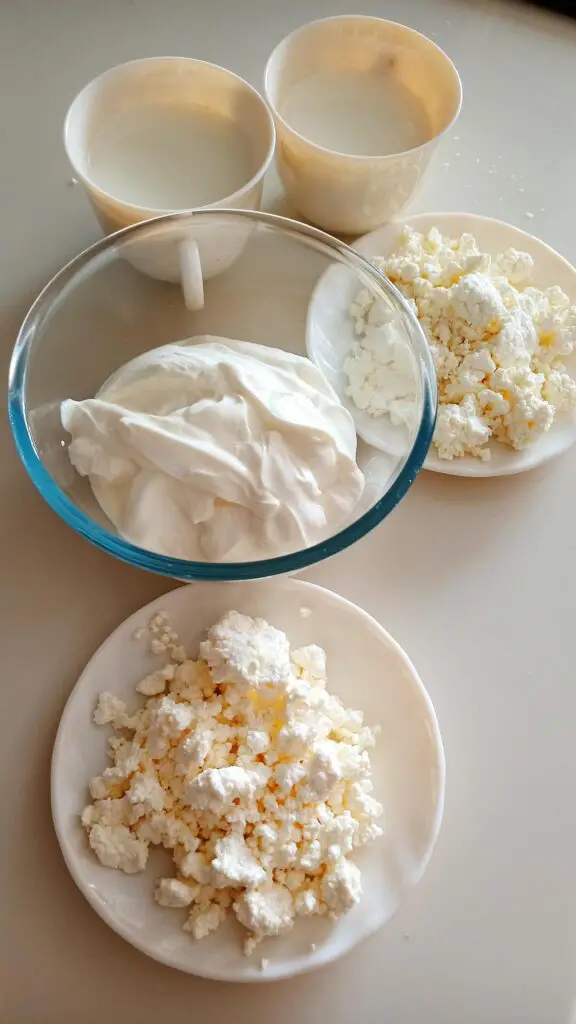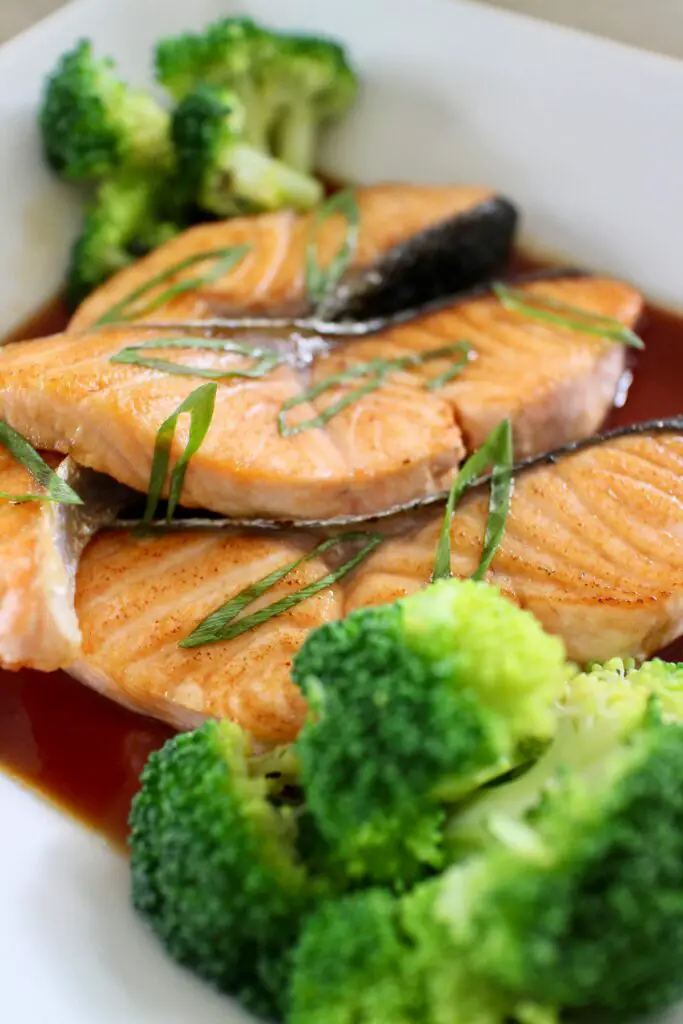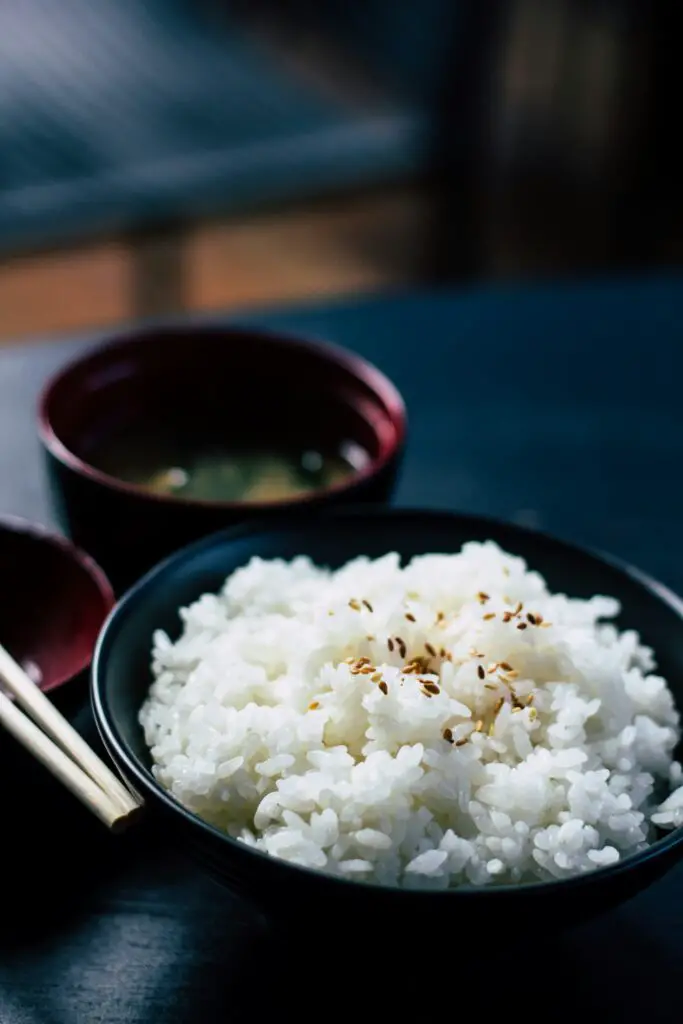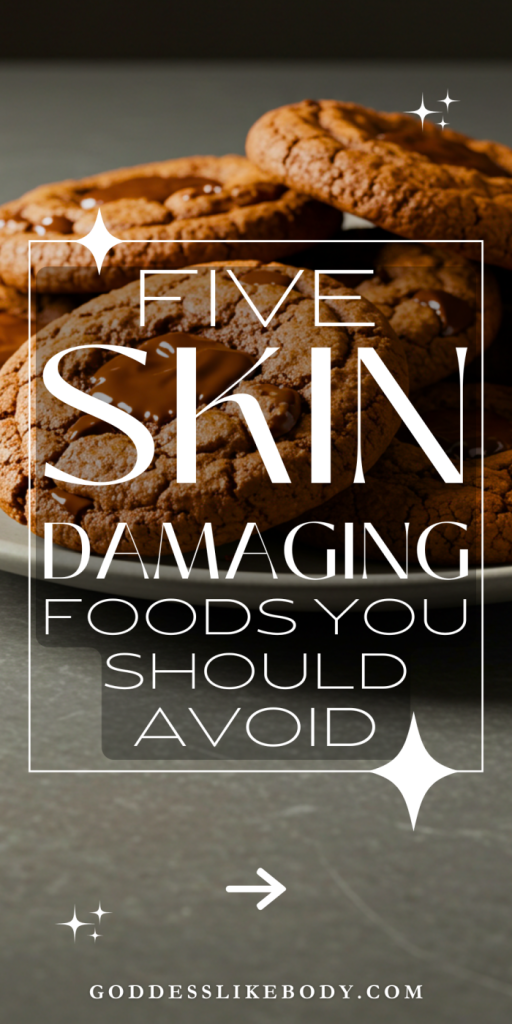Maintaining healthy and radiant skin is a goal for many people. While numerous factors contribute to skin health, one often overlooked aspect is the role of our diet. The food we consume can significantly impact the condition of our skin.
This post will look into the five worst foods for the skin, explaining why they are detrimental and providing alternatives for a healthier complexion.
Busy? Save this pin for later.
1. Processed Sugar
Processed sugar is not only harmful to our overall health, but it can also wreak havoc on our skin. When we consume foods high in processed sugar, such as candies, sodas, and sugary snacks, it leads to a process called glycation.
Glycation causes the breakdown of collagen and elastin, which are essential proteins responsible for maintaining the elasticity and firmness of our skin.
Moreover, foods high in processed sugar have a high glycemic index, causing our blood sugar levels to spike rapidly.
This surge in blood sugar triggers an inflammatory response in the body, leading to acne breakouts and exacerbating conditions like rosacea and eczema.
To provide more detail on the impact of processed sugar on the skin, it is important to understand the mechanism of glycation.
When we consume processed sugar, it attaches to proteins in our body through a process called glycosylation.
This attachment results in the formation of harmful molecules known as advanced glycation end products (AGEs). AGEs can damage collagen and elastin fibers, leading to a loss of elasticity and the formation of wrinkles.
Additionally, the rapid increase in blood sugar levels caused by processed sugar can trigger an insulin response in the body.
High levels of insulin can stimulate the production of androgens, which are hormones that can increase sebum production and lead to oily skin and acne.
Instead of indulging in sugary treats, use natural sweeteners such as honey or maple syrup. These alternatives provide a more gradual release of sugar into the bloodstream, minimizing the negative impact on the skin.
Additionally, incorporate fresh fruits into your diet to satisfy your sweet tooth while providing your body with essential vitamins and antioxidants.
You Might Also Like: 8 Simple Hacks to Keep Your Face Fresh While At The Beach
2. Trans Fats
Trans fats are notorious for their detrimental effects on cardiovascular health, but their impact on the skin should not be overlooked either.
Found in many processed and fried foods, trans fats promote inflammation throughout the body, including the skin.
Consuming foods high in trans fats can lead to clogged pores, increased sebum production, and a higher risk of developing acne.
In addition, trans fats interfere with the body’s ability to absorb beneficial nutrients, depriving the skin of essential vitamins and minerals necessary for a healthy complexion.
To provide more information on the inflammatory effects of trans fats, it is important to highlight the role of prostaglandins.
Prostaglandins are hormone-like substances that play a crucial role in regulating inflammation in the body.
Trans fats can disrupt the balance of prostaglandins, leading to an increase in pro-inflammatory signals and a decrease in anti-inflammatory signals. This imbalance can contribute to skin conditions such as acne, eczema, and psoriasis.
To avoid trans fats, steer clear of fried and processed foods such as french fries, doughnuts, and packaged snacks.
These foods are often high in trans fats due to the hydrogenation process used to prolong their shelf life.
Instead, choose healthier alternatives like avocados, nuts, and seeds that provide healthy fats and nourish the skin from within. These foods are rich in omega-3 fatty acids, which have anti-inflammatory properties and can help maintain a healthy complexion.
3. Dairy Products
Although dairy products are a staple in many diets, they can have a negative impact on the skin, particularly for those with certain skin conditions.
Cow’s milk contains hormones that can interfere with our own hormonal balance, triggering acne breakouts.
Moreover, dairy products have been linked to increased sebum production, leading to oily skin and clogged pores. This can result in the development of blackheads, whiteheads, and other forms of acne.
To provide more information on the hormonal effects of dairy products, it is important to highlight the presence of insulin-like growth factor 1 (IGF-1) in cow’s milk. IGF-1 is a hormone that promotes cell growth and division, including the growth of skin cells.
However, excessive levels of IGF-1 can contribute to the development of acne by increasing sebum production and clogging pores.
If you suspect that dairy may be affecting your skin, try substituting cow’s milk with plant-based alternatives like almond milk or oat milk.
These alternatives are often fortified with vitamins and minerals, providing additional benefits for your skin.
Additionally, incorporating probiotic-rich foods like yogurt or kefir into your diet can help support a healthy gut microbiome, which in turn can improve skin health.
You Might Also Like: 7 Ways to Keep Your Skin Looking Young And Fresh
4. High-Mercury Fish
While fish is generally considered a healthy food, certain varieties can be detrimental to our skin due to their high mercury content.
Mercury is a heavy metal that accumulates in the body over time and can lead to various health issues, including skin problems.
Fish such as shark, swordfish, and king mackerel are known to contain high levels of mercury. When consumed regularly, this heavy metal can induce inflammation and cause skin rashes, redness, and irritation.
To provide more detail on the effects of mercury on the skin, it is important to understand its impact on oxidative stress.
Mercury can generate reactive oxygen species (ROS) in the body, which can damage cells and lead to oxidative stress. This oxidative stress can contribute to skin aging, inflammation, and the development of skin conditions such as dermatitis and eczema.
To protect your skin, eat low-mercury fish options such as salmon, trout, and sardines. These fish are not only rich in omega-3 fatty acids, which promote skin health, but they also have lower mercury levels, reducing the risk of skin-related issues.
It is also recommended to limit the consumption of high-mercury fish to once or twice a month to minimize exposure.
5. Refined Grains
Refined grains, such as white bread, pasta, and rice, have undergone extensive processing, stripping them of their natural nutrients and fiber.
These refined carbohydrates have a high glycemic index, similar to processed sugar, leading to spikes in blood sugar levels and subsequent inflammation.
When we consume refined grains, our bodies break them down into sugars, causing collagen and elastin fibers to become weak and less resilient. This can result in premature aging, wrinkling, and a dull complexion.
To provide more information on the impact of refined grains on the skin, it is important to highlight the role of advanced glycation end products (AGEs) once again.
As mentioned earlier, AGEs are harmful molecules formed through the glycation process. Consuming refined grains can increase the production of AGEs in the body, further contributing to the breakdown of collagen and elastin fibers.
To promote healthy skin, use whole grains like quinoa, brown rice, and whole-wheat bread. These unrefined alternatives provide essential nutrients, antioxidants, and fiber to support overall skin health and radiance.
The fiber content in whole grains also helps regulate blood sugar levels, reducing the risk of inflammation and skin issues.
By avoiding or minimizing the consumption of these five worst foods for skin, you can take significant steps towards achieving a healthier complexion.
Keep in mind that, nourishing your body with wholesome, nutrient-dense foods not only benefits your skin but also enhances your overall well-being. So, make conscious diet choices that promote skin health from the inside out.
You Might Also Like: What is Dermarolling and Is It Good for Your Skin?










Leave a Reply
You must be logged in to post a comment.